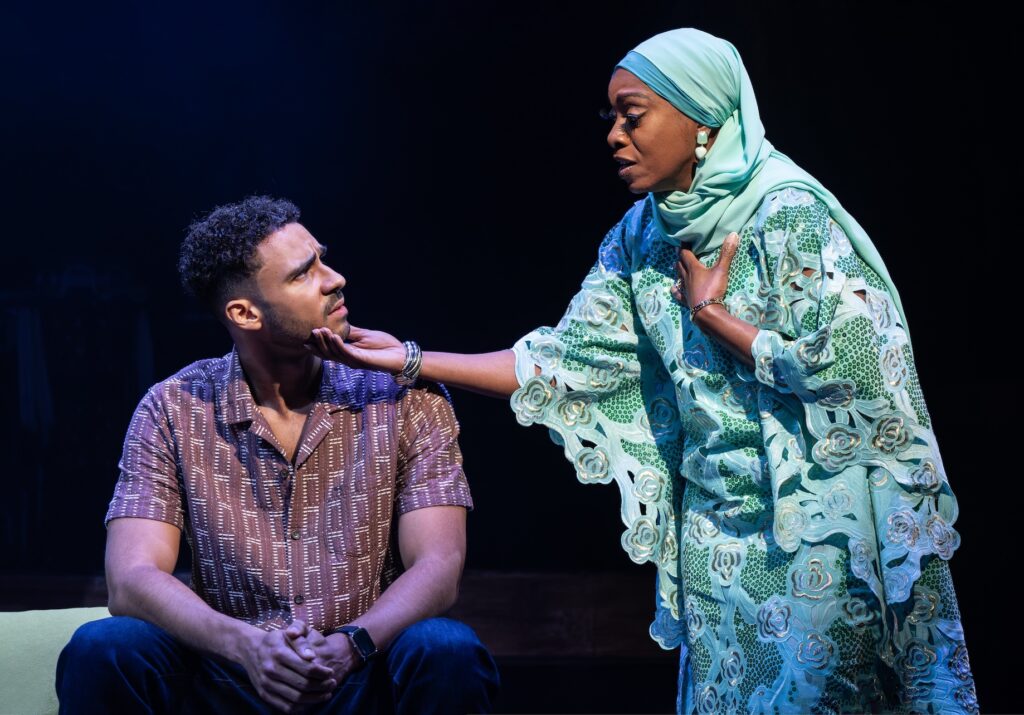Decorated Director of ‘Buena Vista Social Club’ and ‘Fat Ham,’ Saheem Ali, Is Back With ‘Goddess’
The new musical is a buoyant, if sometimes corny, celebration of love’s ability to overcome long odds — especially when a little magic is thrown into the mix.

As star-crossed lovers go, the romantic hero and heroine of the new musical “Goddess” would seem to face an especially tough predicament: Omari is a human male and Nadira is, well, the title character — a deity.
Or, to be more specific, Nadira is the human form assumed by Marimba, identified here as the goddess of music — a figure from African folklore whom Saheem Ali, the show’s librettist, discovered while attending high school in his native Kenya. Mr. Ali is best known for his work as a director, including such acclaimed productions as “Buena Vista Social Club,” which recently earned him his second Tony Award nomination, and the Pulitzer Prize-winning “Fat Ham.”
For “Goddess,” which Mr. Ali directs as well, he has teamed with Michael Thurber, a composer and lyricist who has also played bass for an array of noted musicians, and “Fat Ham” playwright James Ijames, who wrote additional material for the book. The result is a buoyant, if sometimes corny, celebration of love’s ability to overcome long odds — especially when a little magic is thrown into the mix.
The story finds Omari meeting Nadira at a Kenyan nightclub called Moto Moto, in the coastal city of Mombasa. She’s the house singer, a position assumed after, as Marimba, she defied her mother’s wish to make her a goddess of war. Omari has returned from school in New York to run for governor, a position held by his conservative father, Hassan, who sees Moto Moto as a den of iniquity and wants to shut it down.

But Omari, too, reveals himself to be a rebel against parental authority — and an expert saxophone player, conveniently, who first bonds with Nadira over their passion for music. Problem is, Omari has a fiancée, Cheche, whom his mom and dad, pious Muslims, chose for him when they were only children.
Other couples and conflicts quickly materialize: There’s the garrulous, goofy Ahmed, who works at the club and pines for his sassy colleague, Rashida. Hassan and his wife, Siti, lend more comic relief, at least when Hassan isn’t dressing down his son, while Madongo, the club’s slick, arrogant owner, has his eye on Nadira.
If these scenarios, and much of the dialogue, can suggest an African rom-com, Mr. Ali and his cast and collaborators sustain an exuberant spirit over the musical’s two acts — especially during the catchy production numbers, which combine Afrobeat and other world music textures that are enhanced by Darrell Grand Moultrie’s vibrant, playful choreography.
Mr. Thurber has also provided several R&B-infused, jazz-tinged ballads, particularly for Nadira, played here by Amber Iman, whose warm, soulful voice suits the material well. Melessie Clark, Teshomech Olenja, and Awa Sal Secka also sing beautifully as the “Griotrio,” which functions as a sort of Greek chorus while representing a tradition of tribal storytelling.
Austin Scott brings a winningly light touch to Omari, while Destinee Rea captures Cheche’s sometimes abrasive ambitiousness without making her unsympathetic. Nick Rashad Burroughs’s Ahmed is a lively master of ceremonies when not striving to win over Arica Jackson’s feisty Rashida, and J Paul Nicholas and Ayana George Jackson make a cute older pair as, respectively, Hassan and Siti.
Even Jason Bowen’s preening, predatory Madongo is ultimately more comical than disturbing. In his program note for “Goddess,” Mr. Ali signs off by advising audience members to “live well” and “love hard,” and this musical and production, however sentimental at points, make a strong case for doing both.

